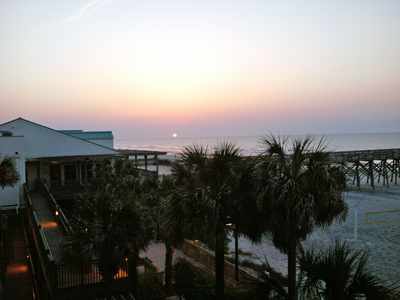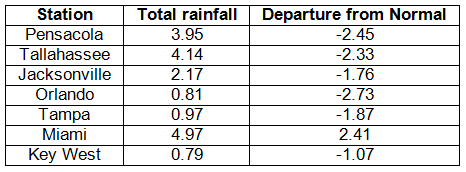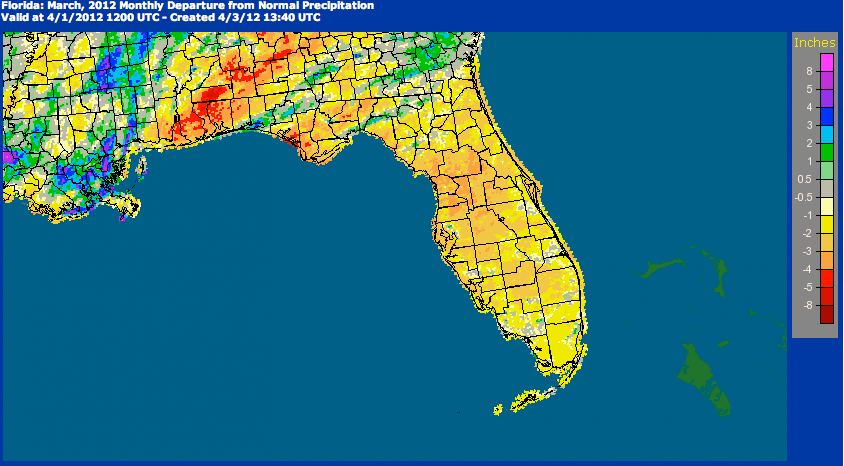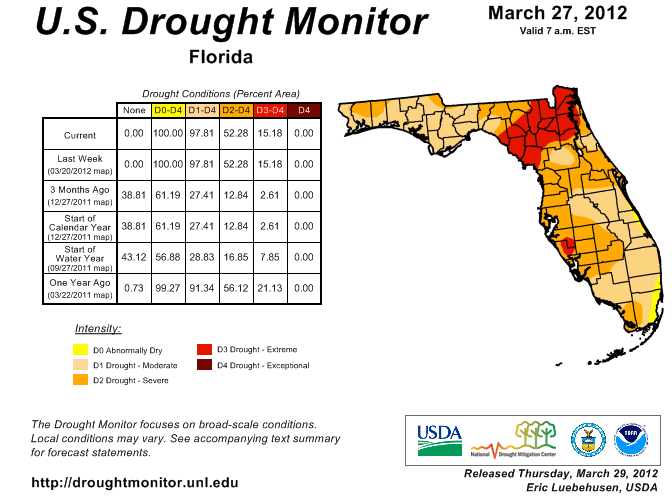| Quick Facts | |
1,159 Registered FL Observers
466 Active FL Observers
11,557 FL Reports Submitted during 3/12
Greatest # of Daily Reports Submitted during February: 395 on 3/4/12
Most Rainfall Reported during March: 7.28" on 3/4/12 from Station FL-JK-2 |
|
|
|
Spring Fever |
 | | Folly Beach, SC, sunrise. |
The last few weeks have had me all over the eastern part of the United States. From vacationing in Tennessee, to attending a meeting on a beach in South Carolina, then up to the Mid-Atlantic for a failed attempt to see the cherry blossoms, then back to Florida and off to Alabama in a week's time for another conference... I have gotten my frequent flyer miles. I spent most of the trip enjoying the above-normal temperatures, though the Mid-Atlantic threw me a curveball, and the temperatures didn't get out of the 40s one of the days I was there.
I've been slowly going through my email, but for those of you who are new to the program and signed up during the month of March, I'd like to extend a warm (yes, pun intended) welcome! Please let me know if you have any questions... and that holds for all of you veteran CoCoRaHS observers, too. |
|
0.00" Is the Loneliest Number |
I haven't mentioned it in a while, but given our ongoing drought conditions, I figured it's time to dust off my precipitation mantra and put it out there once again... So, here it goes: "
Zeroes are numbers too! Please report your zeroes!"
As I was reviewing the numbers for March, I noticed that, for the most part, zeroes were being reported, but the numbers have dropped off from previous months. I realize that reporting 0.00" isn't any fun because you don't get to dump the water from the tubes... or in my case, fling the water at unsuspecting undergraduate students. However, knowing when and where the rain didn't fall is as important as knowing where it did, especially given our drought situation. |
|
Hurricane Preparedness Event |
The National Weather Service in Tallahassee and the State Emergency Response Team are hosting a community hurricane preparedness event at the Tallahassee Regional Airport on Thursday, May 3. There will be displays; weather balloon launches; tours of emergency response vehicles, aircrafts, and helicopters; and more. I'll be out and about on the tarmac talking about weather, climate, hurricanes, and of course CoCoRaHS! The event is from 9 am - 5 pm. Please stop by and say 'hello' if you can. For more information, you can contact Kelly Godsey at Kelly.Godsey@noaa.gov. |
|
March Rains |
Rainfall totals varied statewide in March (Table 1). Most stations saw below normal rainfall, while Miami saw slightly above normal rainfall. Portions of Jackson, Walton, and Washington counties in the Panhandle saw rainfall totals approximately 3.00" above normal. Heavy rains mainly impacted southeast portions of the state during two separate rain events (Table 2). Areal patterns of monthly rainfall relative to normal are depicted in Figure 1.
| Table 1: March precipitation totals and departures from normal (inches) for select cities. |
|  |
|
Table 2: Select daily rainfall records (inches) broken during March (compiled from NOAA, NWS). |  |
|
|
Figure 1: A graphical depiction of the monthly rainfall departure from normal (inches) for March (courtesy of NOAA, NWS) |  |
|
|
March CoCoRaHS Totals |
Here are the CoCoRaHS rainfall totals for March from some select CoCoRaHS stations across the state.
| |
|
Current State of the Drought |
Since the beginning of March, the drought conditions have gotten worse in some areas but eased in others. Some of the rains during the month eased the extreme drought conditions in the Panhandle and Big Bend regions, with some counties, such as Leon, Gadsden, Jackson, and Washington, seeing a two-category improvement in their drought designation. The area of extreme drought continues to linger from Duval and Nassau counties across the northeast portion of the state to Dixie and Levy counties. The area of D2 (severe) drought increased in the central part of the state, and areas of southeast Florida are now listed in moderate drought. The Climate Prediction Center is calling for near-normal rainfall through June; however, April and May are typically the driest months for many locations across the state.
The National Drought Monitor is updated weekly, so you can always check the most recent conditions here: http://www.drought.unl.edu/dm/DM_state.htm?FL,SE.

|
|
|
Odds and Ends |
Work has been completed on a new Florida Climate Center website at http://climatecenter.fsu.edu. The new site includes a new interactive data visualization tool, which allows users to examine data from approximately 100 long-term stations across the state, as well as a download tool for temperature and precipitation data.
You can now 'Like' Florida CoCoRaHS on Facebook! By joining our Facebook page, the latest Florida CoCoRaHS news items will automatically show up in your "news feed" when you first login to Facebook. To join, click the "Find us on Facebook" link in the menu bar of this email, then click the "like" button on our Facebook page. | |
|
Thank You!
Thank you for your continued support and enthusiasm! If at any time you have questions about CoCoRaHS, reading your rain gauge, or finding a location to setup your rain gauge, please feel to contact a Florida CoCoRaHS Coordinator. We are lucky enough to have regional support from National Weather Service offices across the state, as well as county/local help from several CoCoRaHS volunteers.
 Melissa Griffin Florida CoCoRaHS State Coordinator Assistant State Climatologist Florida Climate Center/Center for Ocean-Atmospheric Prediction Studies Florida State University 232 R.M. Johnson Building Tallahassee, FL 32306-2840 (850) 644-0719 griffin@coaps.fsu.edu | |
|